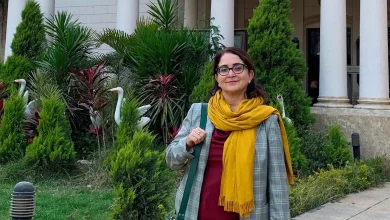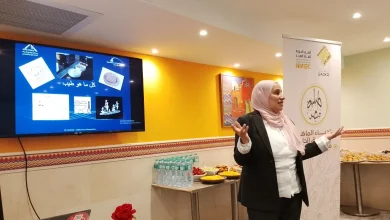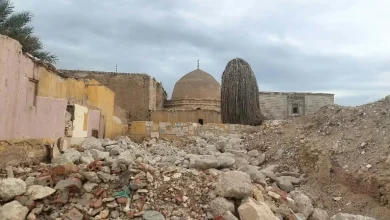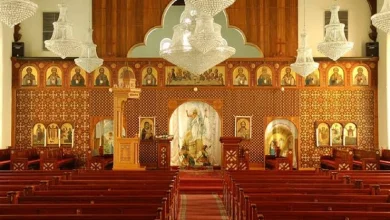
Khaled Al-Anani’s promises at UNESCO: preserving heritage, freedom of expression, and protecting journalists’ rights
BabMsr obtained a copy of the speeches of the three candidates for the position of Director-General of UNESCO, which will be announced in October. The Egyptian candidate, Khaled El-Anany, former Minister of Antiquities, is competing against Gabriela Ramos, Assistant Director-General for Social and Human Sciences at UNESCO, and Congolese Fermin Edouard Matoko, Assistant Director-General for Africa and External Relations at the organization
. The Egyptian candidate Khaled El-Anany’s vision is “UNESCO for People,” and his program focuses on putting people at the forefront of UNESCO’s work “without discrimination or distinction.” He also seeks to combat bureaucracy within the organization and proposes several mechanisms to diversify its sources of funding, such as exploring new opportunities for fundraising, including media partnerships and cultural events, as well as launching fundraising campaigns. He also intends to set up an emergency fund, stressing the need for UNESCO to be prepared through this fund to deal with emergencies such as natural disasters, conflicts and crises.
However, some assessments suggest that Al-Anani’s vision lacks clear priorities for new initiatives, covering almost all aspects of UNESCO’s work, which makes it seem like a comprehensive list of what the organization already does. His frequent use of the term “continuity” rather than “transformation” is also noted, despite some new proposals. He used phrases such as “UNESCO will continue” or “UNESCO will remain steadfast,” which can be understood as supporting the organization’s current role rather than proposing radical solutions for an institution facing growing criticism for its bureaucratic approach to changing global challenges.
The organization’s values
On the other hand, his proposed fundraising strategies need careful study, especially since his vision calls for diversifying funding sources through media partnerships and sponsored cultural events. Despite the importance of financial sustainability, especially after the United States withdrew from the organization for five years and the ensuing financial crisis, Al-Anani did not clarify the mechanisms for implementing these ideas. Therefore, implementing this plan without careful management could lead to a potential conflict between the interests of donors and the core values that the organization protects.
Supporting national policies
With regard to heritage, Al-Anani promised to preserve natural and cultural heritage through the use of modern science and technology, as well as training teachers and promoting field trips to these sites, with the aim of connecting students from around the world with their heritage.
He also promised that the organization would work to protect cultural property during conflicts, combat illicit trafficking, and protect underwater, natural, and tangible and intangible cultural heritage.
Despite these promises, neither Al-Anani nor any of the other candidates presented a logical plan for dealing with World Heritage sites under threat, especially those threatened by armed conflicts in which many countries have recently been involved, including the Russian-Ukrainian war and the ongoing attacks on Palestinian, Sudanese, Yemeni, and Syrian heritage.
Cooperation with advisory bodies
To ensure better representation of countries on UNESCO lists, Al-Anani promised to provide dedicated assistance to countries in the registration process through cooperation with advisory bodies within the organization, especially for under-represented countries. Priority will be given to sites threatened with extinction, and efforts will be made to attract financial resources to preserve heritage and promote the concept of sustainable tourism, thereby ensuring the protection of heritage sites.
It also pledged to support national policies that stimulate cultural and creative industries as a driving force for social and economic development. UNESCO will continue to protect the rights and freedoms of artists, professionals and cultural workers and support them in times of crisis. In addition, the organization will continue to play its pivotal role in ensuring the safety of journalists and media workers, especially women, and protecting freedom of opinion and expression. It will also support independent, free and pluralistic media.
Education and climate change
Al-Anani intends to adhere to UNESCO’s laws and regulations as a reference for all decisions taken by the organization. This is in addition to supporting teachers, scientists, researchers, artists, journalists and all individuals concerned with promoting the organization’s mission, with a promise to protect their full rights.
In the field of education, he promised to increase investment in infrastructure and internet access, especially in areas related to peace, human rights, sustainable development, and global citizenship. This also includes education about genocide and violent pasts. In addition, school curricula will be updated, with a focus on digital learning.
On climate issues, he affirmed that UNESCO will respond to countries’ needs in addressing the impact of climate change, which will be done through media, education, and awareness-raising. The organization will continue its efforts in climate action, biodiversity, ecosystems, geological diversity conservation, water security, ocean management, and disaster risk reduction. It will also strengthen collaborative research and environmental monitoring within World Heritage sites.
Challenges facing the African continent
As for Africa, Egypt’s candidate pledged to respond to the global priority for Africa by supporting communities within the continent. With the aim of addressing the challenges facing the continent, the organization will work to strengthen cooperation with these countries, as well as with the African Union and international actors.
He also promised to empower young people by developing their skills and promoting cultural and academic exchange programs, while involving them in decision-making processes. In his speech, he said: “Measures must also be taken to effectively support vulnerable groups in times of emergency, such as natural disasters, conflicts and crises; therefore, the organization must be prepared, by allocating a fund aimed at fulfilling the roles of the institution.”
At the end of his speech, Al-Anani described his vision as an outstretched hand and a call to action for an organization capable of uniting people by promoting dialogue, trust, and respect. He said, “Let us unite to build a UNESCO for the people.”

The vision of the Mexican candidate
On the other hand, the vision came under the slogan: “Shaping a more inclusive, powerful and innovative UNESCO for the 21st century.” Ramos began her speech by promoting the international positions she has held in an attempt to convince member states of her program. These include her work as Assistant Director-General for Social and Human Sciences since 2020 within the organization.
Ramos acknowledged the decline in confidence in the idea of multilateralism and stressed the urgent need for internal reform at UNESCO. She pointed to international commitments agreed upon in the past. However, she believes that there has been a failure to close the gaps and inequalities that are eroding both societies and democracies.
Despite these failures, Ramos believes that UNESCO remains a strong brand that is respected around the world and has the capacity to address these issues. However, she stressed the need for the organization to deliver on its promises and provide its services in a more effective and transparent manner.
She called for the adoption of an integrated strategy combining science and technology, social policies, and education to achieve the integration that leads to success. She also stressed the importance of instilling more humanities in the international education agenda, adding arts, philosophy, and ethics to the curricula of exact sciences and mathematics. She noted that this approach would highlight the importance of critical thinking in the context of modern education.

Challenges in her vision
Despite the clarity of the strategic themes, Ramos’ vision suffers from the generality of some of the proposals, which weakens their practical feasibility. For example, her call for the implementation of a “comprehensive roadmap” remains vague, making it difficult to translate into a concrete action plan.
Similarly, despite her talk of internal reform within the organization, her solutions were not detailed. She spoke of the problems caused by bureaucracy and red tape. Her speech also failed to mention new and sustainable sources of funding. Despite talk of the need for “funding” in the context of artificial intelligence, the statement does not present a comprehensive and innovative plan to diversify the funding sources for the organization as a whole, which is a major challenge facing international organizations.
At the end of her speech, Ramos said: “I remain committed to leading UNESCO into a good future.”
The vision of the Congolese candidate
The third candidate, Congolese Firmin Edouard Matoko, carried the slogan: “UNESCO… A concept in the service of peace, a special space for dialogue and solidarity.” His vision focused on the deep philosophical foundations of UNESCO. He emphasized that the organization must remain an organization for dialogue and peace between communities. He also believes that pluralism will remain the ideal framework for finding lasting solutions to the multiple crises that threaten global stability.
Creative solutions
Matoko sees UNESCO as a “laboratory of ideas,” pointing to its important role in future thinking by offering innovative solutions. He explained that this vision reinforces the organization’s position as a center for intellectual innovation and the search for creative solutions to global challenges.
His vision focused on Africa, specifically the issue of gender equality, and he also emphasized the allocation of significant resources to Africa, in line with the African Union’s Agenda 2063.
Internal challenges
With regard to expenditure, the Congolese candidate discussed the problem of administrative costs. He clearly stated that administrative costs consume more than half of the organization’s budget. He therefore called for stricter control to ensure an appropriate balance, saying that “it takes courage to face major internal challenges.”
However, despite the strength of his philosophical argument, his vision lacks concrete measures and operational steps to achieve the noble goals he has set. This is particularly true given that he has not established clear mechanisms for implementing his ideas. Furthermore, despite his accurate diagnosis of the problem of administrative expenditure, his proposals for “new financial mechanisms” lack detail. His proposals for “new financial mechanisms” lack specificity, leaving questions about how this financial reform will be achieved.
Like El-Anani, there is a focus on ‘continuity’ in some areas without an emphasis on innovation. Matoko uses phrases such as “we will continue to strengthen the work,” This suggests continuity at the expense of radical innovation or the introduction of entirely new approaches.
Breaking down barriers
At the end of his speech, the Congolese candidate said he was committed to preserving the fundamental unity between UNESCO’s departments. He also made it clear that there are no worse barriers to peace among peoples, which is a noble goal that everyone is striving to achieve.
He added: “UNESCO has the power to break down these barriers in the minds of the men and women of this planet. I therefore believe that it is possible to make our organization stronger and more committed to promoting peace while preserving the universal values that underpin peace and development and ensure a sustainable future for generations to come.”
Read also:
After the Deir Saint Catherine crisis, has Khaled El-Anany lost the battle for UNESCO?





Hi, this is a comment.
To get started with moderating, editing, and deleting comments, please visit the Comments screen in the dashboard.
Can you be more specific about the content of your article? After reading it, I still have some doubts. Hope you can help me. https://www.binance.com/register?ref=IXBIAFVY
Reading your article helped me a lot and I agree with you. But I still have some doubts, can you clarify for me? I’ll keep an eye out for your answers.
Your point of view caught my eye and was very interesting. Thanks. I have a question for you.
Your point of view caught my eye and was very interesting. Thanks. I have a question for you.
Your article helped me a lot, is there any more related content? Thanks! https://www.binance.info/es/register?ref=RQUR4BEO
I don’t think the title of your article matches the content lol. Just kidding, mainly because I had some doubts after reading the article.
Your article helped me a lot, is there any more related content? Thanks!